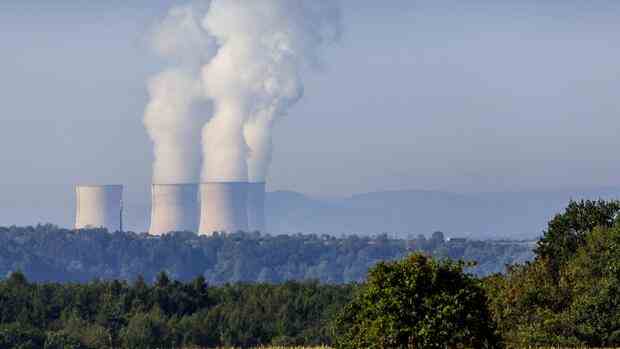Many nuclear reactors in France are running again.
(Photo: imago images/Arnulf Hettrich)
Paris The warnings before the winter were drastic in France: Because of the shutdown of a number of nuclear power plants, there could be supply bottlenecks, it said. The government called on citizens and companies to save energy, the network operator RTE played through emergency scenarios. In the worst case, the electricity should be temporarily switched off in certain areas.
The government spoke of “extraordinary measures as a last resort”. In view of the clear crisis communication, many French feared that it would also be cold and dark in their apartments. In view of the problems of the nuclear power plants, Germany felt confirmed on the way to phasing out nuclear power.
But France has so far come through the winter much better than expected. Since December 19, the country has even resumed its traditional position as a net exporter of electricity. As data from RTE show, on a few days since the beginning of the year even Germany has imported more electricity from France than it exported there.
44 of the 56 reactors are operational
Are the energy worries of the nuclear nation over now? The professor and energy expert Jean-Michel Gauthier from the Paris business school HEC is dampening hopes. Of course, the production capacity of nuclear power plants has increased again. But the mild winter so far is at least as important – because many French people heat with electricity instead of gas. “Any temperature difference has a significant impact on the availability of electricity in France in winter,” he says.
Top jobs of the day
Find the best jobs now and
be notified by email.
The fact that French wind turbines have been supplying more electricity in recent weeks also played a role. Energy Minister Agnès Pannier-Runacher also referred to the energy-saving efforts of households and companies, which had reduced consumption by seven gigawatts. “That corresponds to the electricity production of seven nuclear reactors,” said the minister.
loaded
45
gigawatts
nuclear generation capacity will be available to France this January, according to state-owned energy utility EDF.
But one thing is also certain: the electricity company EDF has largely kept its ambitious promises and brought many nuclear power plants back to the grid. Currently 44 of the 56 French reactors are operational. As planned, a good 45 gigawatts of nuclear generation capacity is available in January, EDF announced, and it will increase by the end of the month as more reactors are ramped up.
>> Also read here: “Winter is getting complicated” – French companies fear power outages
In France, the nuclear reactors are considered a guarantee of energy sovereignty and cover around 70 percent of the electricity supply in normal times. Ironically, the nuclear power plant weakened during the energy crisis fueled by the halt to Russian gas supplies. In the past year, more than half of the reactors were temporarily idle.
EDF had to take a part off the grid to check the pipes of the emergency cooling system for the smallest cracks. Corrosion damage was discovered on some systems. In addition to these unforeseen shutdowns, more reactors than usual were shut down for routine maintenance that had been postponed during the pandemic.
Signs of “some return to normal”
During a visit to the Penly nuclear power plant in Normandy in December, EDF boss Luc Rémont said the company’s workers were “totally mobilized” to solve the “technical problems”. External help was also brought in, including welders from the USA and Canada.
>> Also read here: Nuclear fuel rods from Tomsk: Europe’s incredible dependence on Russia
A few weeks later, however, it became clear how complicated it is to check and re-weld the pipes: EDF had to postpone the restart of Penly 1 from the end of January to the end of March, and Penly 2 to mid-June.
Energy expert Gauthier sees signs of “a certain return to normality”. At the same time, however, he warns that it may take some time before the nuclear capacities are fully operational. This is mainly due to the fact that the major maintenance program for the lifetime extension of the French reactors will be carried out until 2025.
The reactors are gradually shut down for routine work. Only after the maintenance work has been completed “will France have pulled itself out of the affair and have extended the life of its power plants by ten years,” says Gauthier.
The grid operator RTE expects that the availability of the reactor park will reach a temporary peak in February and then fall again. This is also due to the fact that there will be construction sites in 2023 due to the corrosion problems at six other reactors. France could therefore soon be dependent on electricity imports again.
More: France’s economy minister: “I demand a coordinated, united and strong response to the US”
